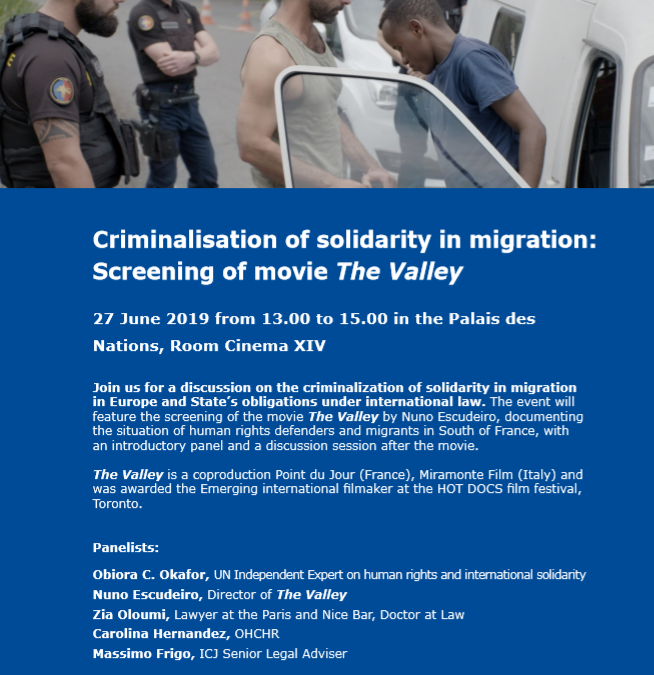
Jun 24, 2019 | Events, News
The OHCHR, ICJ and the Geneva Bar Association invite you to a discussion on the criminalization of solidarity in migration in Europe and State’s obligations under international law.
Thursday, 27 June, 13h00,
UN Cinema (Room XIV),
Palais des Nations, Geneva
The event will feature the screening of the movie “The Valley” by Nuno Escudeiro, documenting the situation of human rights defenders and migrants in South of France, with an introductory panel and a discussion session after the movie.
The Valley is a coproduction of Point du Jour (France) and Miramonte Film (Italy), and was awarded the Emerging international filmmaker at the HOT DOCS film festival, Toronto.
Panelists:
- Obiora C. Okafor, UN Independent Expert on human rights and international solidarity
- Nuno Escudeiro, Director of The Valley
- Zia Oloumi, Lawyer at the Paris and Nice Bar, Doctor at Law
- Carolina Hernandez, OHCHR
- Massimo Frigo, ICJ Senior Legal Adviser
If you do not already have a grounds pass to access the Palais des Nations, please send your name and surname at migration@ohchr.org before the end of Sunday 23 June.
For more information contact massimo.frigo(a)icj.org
A flyer for the event is avaiable here.
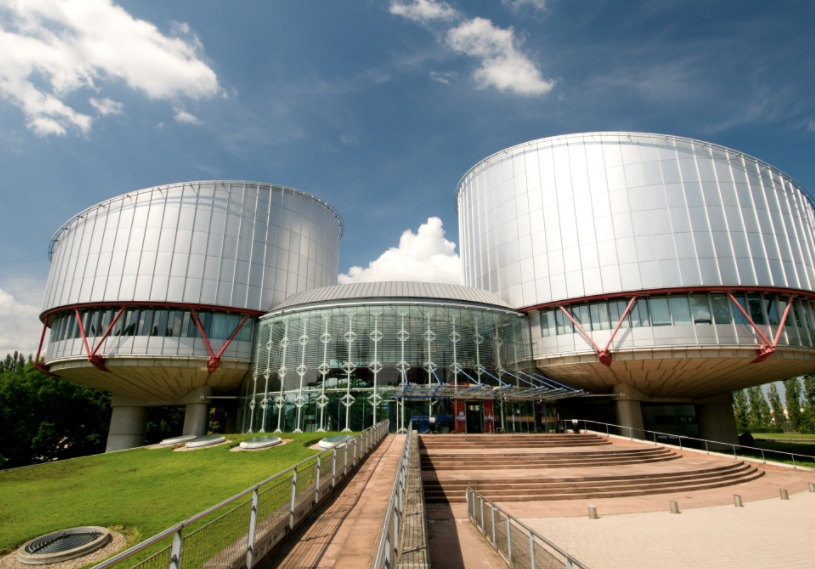
Jun 20, 2019 | Advocacy, Cases, Legal submissions, News
The International Commission of Jurists, jointly with Amnesty International and the Turkey Litigation Support Project intervened today before the European Court of Human Rights in the case of a Turkish public servant, Hamit Pişkin, who was dismissed by executive decrees during the State of Emergency.
The case is key with regard to the situation in Turkey now and under the State of Emergency, because it raises significant questions regarding procedural rights in employment proceedings leading to the dismissal of an employee working with or for a State agency on grounds related to national security, including under a State of Emergency, as well as the application of the principles of legality and legal certainty and non-retroactivity as applied to national security, including in counter-terrorism.
During the State of Emergency in Turkey, that lasted two years from 2016 to 2018, almost 130,000 employees in the public sector were dismissed under emergency legislation. Their dismissal however remained in force also after the end of the State of Emergency.
In the submission, the interveners provide the European Court of Human Rights with observations concerning:
- the applicability of the criminal limb of Article 6 of the European Convention on Human Rights (ECHR) to judicial proceedings leading to dismissal of an employee of a public institution;
- the lack of procedural guarantees in the dismissal process necessary to comply with Article 6 of the ECHR, in particular with the presumption of innocence Article 6(2), in such proceedings;
- the application of the principles of legal certainty and non- retroactivity to such decisions (by addressing the problems arising from the application of State of Emergency decrees to events that occurred before the declaration of the State of Emergency).
The full intervention can be downloaded here: Piskin_v_Turkey-ECtHR-TPI-ICJAITLSP-2019-eng
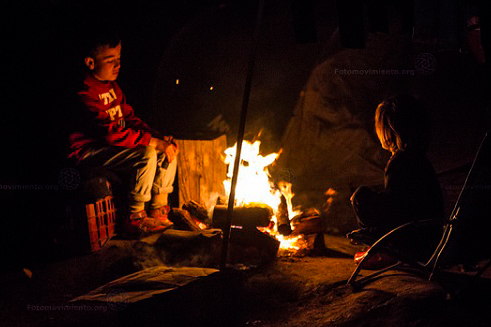
Jun 4, 2019 | News
The ICJ, European Council on Refugees and Exiles (ECRE) and the Greek Council for Refugees (GCR) welcome the decision of the European Committee on Social Rights that Greece should take “immediate measures” to protect the rights of migrant children as required under the European Social Charter.
The Greek government should now take urgent steps to comply with the Committee’s decision, to prevent serious and irreparable injury or harm to the children concerned, including damage to their physical and mental health, and to their safety.
The Committee’s decision, issued on 23 May, requires the government to immediately provide migrant children with appropriate shelter, food, water, education and medical care; to remove unaccompanied migrant children from detention and from Reception and Identification Centers (RICs) at the borders, place them in suitable accommodation for their age and appoint effective guardians.
The Committee noted that “immediate measures” were exceptional, but found that they were necessary in this case given the government’s failure to dispel serious concerns about the gravity and urgency of the situation of migrant children in Greece.
This decision is in response to a collective complaint brought before the Committee by ICJ, ECRE and GCR, alleging systemic violations of migrant children’s rights on mainland Greece and the North Eastern Aegean islands. The complaint catalogues the numerous ways in which Greece has failed to fulfill its obligations under the European Social Charter to protect the rights migrant children, leaving them in conditions of squalor, insecurity and violence.
In addition to indicating immediate measures, the Committee found the complaint itself admissible. The complaint now awaits examination and determination on the merits by the European Committee on Social Rights.
Read the statement on the decision here in English and in Greek and full complaint here.
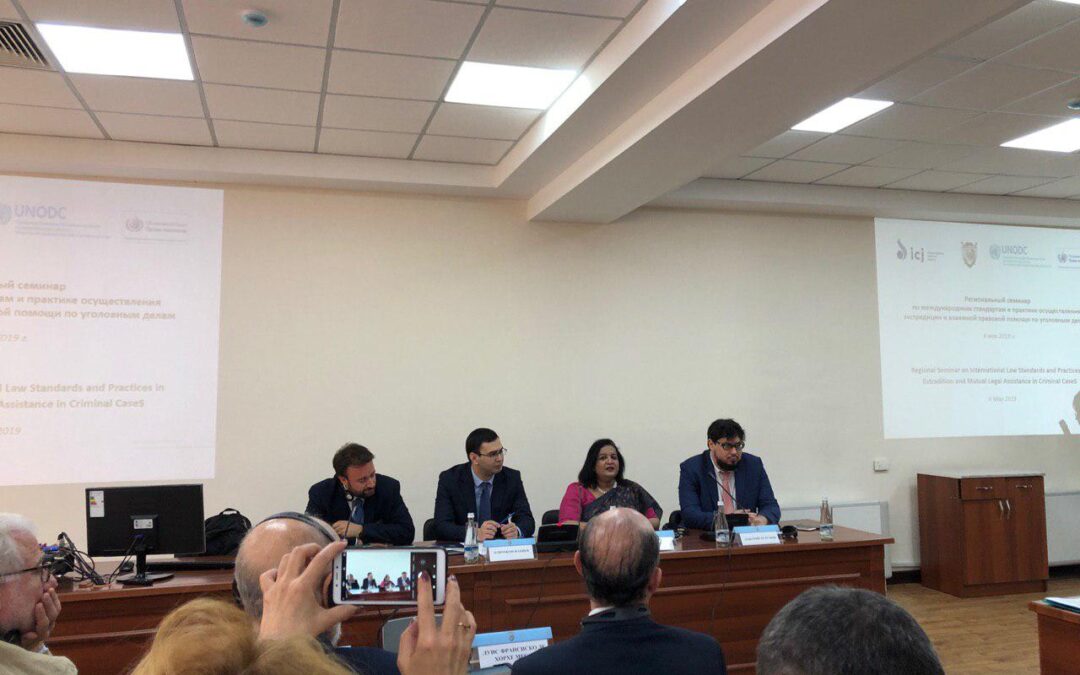
May 6, 2019 | Agendas, Events
Today, the ICJ, together with the General Prosecutor’s Office of Uzbekistan, UNODC and OHCHR are holding the first regional meeting of prosecutors from Central Asia and the Russian Federation to discuss international law and standards in the field of extradition, mutual legal assistance, the rule of law and human rights.
The workshop aims to facilitate exchange of experiences regarding the law and practice of extradition in European and Central Asian countries. Presentations at the workshop will analyse international law and standards on effective criminal justice co-operation and the protection of human rights in extradition, and their application in practice..
The workshop will present cases of mutual cooperation in the field of criminal law from national courts as well as from international mechanisms such as the European Court of Human Rights, the UN Committee against Torture and the UN Human Rights Committee.
The workshop is taking place in Tashkent (Uzbekistan) and is hosted by the Prosecutor General’s Office of Uzbekistan.
More than twenty prosecutors from Kazakhstan, Kyrgyzstan the Russian Federation Tajikistan, Turkmenistan, and Uzbekistan are participating in the event that includes international experts from UNODC, ICJ, including ICJ Commissioner and Emeritus Spanish Supreme Court Justice, José Antonio Martin Pallin, and Italian Prosecutor Lorenzo Salazar.
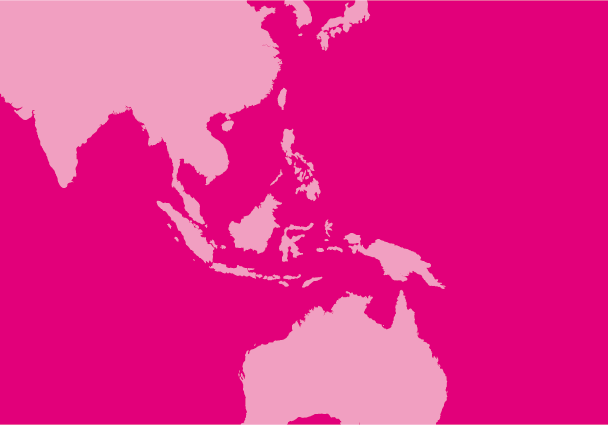
Apr 11, 2019 | Advocacy
Today the ICJ joined twenty organizations in calling for Myanmar’s new Constitutional Amendment Committee to fully protect the right to freedom of expression in the Constitution, in line with international law and standards including Article 19 of the International Covenant on Civil and Political Rights.
The statement reads:
“20 expert organisations urge Myanmar to fully guarantee the internationally protected right to freedom of expression in the Constitution
11 April 2019 — A new parliamentary committee tasked with reviewing Myanmar’s constitution is an opportunity for the government to guarantee the democratic rights to free expression, media freedom, and access to information.
We welcome the government’s creation of the Constitutional Amendment Committee, established to review and propose amendments that will support Myanmar’s transition to democracy.
Myanmar’s 2008 Constitution does not include the guarantees required in a democracy to protect freedom of expression. Those that it does include do not meet relevant international human rights standards. This threatens the transition to and quality of Myanmar’s democracy as can be seen for example in the wide range of laws used to prosecute journalists and human rights defenders.
We call on the Constitutional Amendment Committee to recommend:
- Replacement of the current heavily prescribed guarantee for freedom of expression in Articles 354(a) and 365 with a single article that guarantees the right to freedom of expression in accordance with international standards, so that it fully reflects the requirements of Article 19 of the International Covenant on Civil and Political Rights.
- A new separate article guaranteeing the right to access information held by public authorities.
- A new separate article guaranteeing media freedom, which should prohibit prior censorship of the media or licensing of the print media and individual journalists, and should protect journalism as well as the independence of the Myanmar Press Council, Myanmar Broadcasting Council, and any future public service media.
- Each guarantee should include only those limitations that are provided by law and are necessary for the respect of the rights or reputations of others, or for the protection of national security or of public order, or of public health or morals.
We are committed to supporting Myanmar’s transition to democracy and would be happy to provide further information and guidance as the Committee conducts its review.”
Signed by 20 organizations with the support of 13 other organizations.
Full statement and list of organizations available in English and Burmese here: Myanmar-Joint Statement on FoE and Const Ref-Advocacy-2019-BUR









